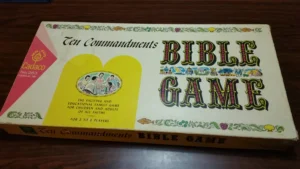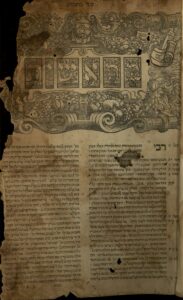When I was a boy, my family had this very game! I remember playing it with my sisters. You moved your piece around a map of the Holy Land, gathering wheat, olives, fish, and grain to give to the poor and, one by one, collecting and memorizing each of the Ten Commandments. The winner was the first to collect all ten, and recite them to a Philistine. I still remember a visiting aunt scolding me when I told her that the game was fun! The Bible, she said, isn’t supposed to be fun.
But fortunately, no one told the rabbis! For the last several weeks, I have been working through Midrash Rabbah, a collection of rabbinic stories, sermons, and conversations about Torah. Specifically, I have been reading the opening chapters of Bereshit Rabbah, dedicated to the creation accounts in Genesis 1–3. A clear sense of playfulness runs all through these conversations. For example: Bereshit Rabbah 20:8 says, regarding Genesis 3:17 (“Cursed is the ground because of you”):
The sign of the curse is that it will produce for you cursed things, such as mosquitoes, midges, and fleas.
Should it produce a pest as large as a camel for you?
Said R. Isaac of Magdala, “But in that case it would produce benefit, for someone could sell it and derive benefit from the proceeds.”
Often, the rabbis play word games with the text. For example, R. Simon wonders how the original light created on the First Day (Genesis 1:3-5) differed from the lights created on Day Four (Genesis 1:14-19)—including the daylight of the sun that we know. Since the word “light” (Hebrew ‘or) occurs five times in Genesis 1:3-5, R. Simon relates that original light to the Torah, which has five books (Bereshit Rabbah 3:5)!
In Bereshit Rabbah 14, the rabbis observe that in Genesis 2:7, where the LORD God creates ‘adam, the word for “formed” is spelled oddly, with two yods (wayiytser). They conclude, then, that there must have been two formations, which some take to mean Adam and Eve (Bereshit Rabbah 14.2), others the upper and lower worlds (Bereshit Rabbah 14.3), and still others this world and world to come (Bereshit Rabbah 14.5). Indeed, R. Hanina bar Idi says that this means God created humans with “both the impulse to do good and the impulse to do evil” (Bereshit Rabbah 14.4)–heady thoughts, prompted by an oddity in spelling!
Psalm 119 (from which Sunday’s Psalm reading is taken) is itself a complicated word game. The psalm consists of twenty-two stanzas, one for each letter of the Hebrew alphabet. Each stanza has eight verses beginning with that letter. But to make the game still more complicated, eight different legal terms are used, usually one to each verse. In addition to “law” (torah) these terms in the NRSV are “decree” (‘edut), “statutes” (khuqqim), “commandments” (mitswot), “ordinances” (mishpatim), “word” (dabar), “precepts” (pequdim), and “promise” (‘imrah). Most of this legal vocabulary comes from Deuteronomy, where these words describe different aspects of God’s law. However, in Psalm 119 no attempt is made to define any of these terms, nor is any distinction made among them. James Luther Mays suggests that in Psalm 119, they are all interchangeable with torah (Psalms [Interpretation; Louisville: John Knox, 1994], 382-383).
This Sunday’s Psalter (Psalm 119:1-8) is the first of these stanzas, so each line begins with ‘aleph:
Those whose way is blameless—
who walk in the Lord’s Instruction—are truly happy!
Those who guard God’s laws are truly happy!
They seek God with all their hearts.
They don’t even do anything wrong!
They walk in God’s ways.
God, you have ordered that your decrees
should be kept most carefully.
How I wish my ways were strong
when it comes to keeping your statutes!
Then I wouldn’t be ashamed
when I examine all your commandments.
I will give thanks to you with a heart that does right
as I learn your righteous rules.
I will keep your statutes.
Please don’t leave me all alone!
The theme of Psalm 119 is expressed in the blessing pronounced in the first two verses:
Happy [‘ashre in Hebrew] are those whose way is blameless,
who walk in the law of the LORD.
Happy [again, ‘ashre] are those who keep his decrees,
who seek him with their whole heart (NRSV)
The word translated “law” in Psalm 119:1 is the Hebrew torah, a word also used for the first five books of the Bible. Although often rendered as “law,” torah could be better translated (as in the CEB) as “instruction.” Psalms 1 and 19 resemble Psalm 119 in content and theme (compare Psalm 1:2 with Psalm 119:15; Psalm 19:7 with Psalm 119:129-130). All three psalms express a life of piety centered on torah. In these poems, Mays suggests, the book of Psalms is viewed not simply as a prayer book, but as instruction in the pious life (The Lord Reigns: A Theological Handbook to the Psalms [Louisville: Westminster John Knox, 1994], 134-135).
Note, though, that this is the LORD’s instruction. Consistently, all these terms are identified as the property of the LORD: it is “the law of the LORD” (verse 1); “his decrees” (verse two); “your precepts” (verse four); “your statutes” (verse 5). Confirmation of this insight comes even in the apparent exceptions to the rule. In Psalm 119:3, none of the eight torah terms appear. However, the Psalmist speaks of the blessed as those “who do no wrong,/ but walk in his ways” (emphasis mine; see also Psalm 119:15 and 37).
Psalm 119 does not identify God’s instruction with the written law: an important distinction, for the ideal of obedience to God’s will can all too easily be corrupted into petty legalism. Remember that Jesus’ opponents chastised him for breaking the law, while Jesus rebuked them for neglecting “the weightier matters of the law: justice and mercy and faith” (Matthew 23:23, NRSV). Unlike those among the religious leadership who opposed Jesus, the Psalmist recognizes that God’s instruction is also God’s gift, which cannot be possessed once for all but must be rediscovered in every time, by every seeker. Mays writes,
The word of God is given but never possessed. Because it is God’s instruction, it is not owned apart from the teaching of God.… it must be sought and constantly studied in prayer in order to be taught (Mays, Psalms, 385).
God’s instruction is a gift. In Christian theological terms, we are saved by grace!

The best expression of what salvation by grace means that I know comes from Frederick Buechner:
A crucial eccentricity of the Christian faith is the assertion that people are saved by grace. There’s nothing you have to do. There’s nothing you have to do. There’s nothing you have to do.
The grace of God means something like: Here is your life. You might never have been, but you are because the party wouldn’t have been complete without you. Here is the world. Beautiful and terrible things will happen. Don’t be afraid. I am with you. Nothing can ever separate us. It’s for you I created the universe. I love you.
There’s only one catch. Like any other gift, the gift of grace can be yours only if you’ll reach out and take it.
Maybe being able to reach out and take it is a gift too (originally published in Wishful Thinking).
We may think that this psalm–indeed, that the Bible–is a grim and humorless series of commands and demands which we must follow unerringly or be condemned by a wrathful God. However, the rabbis in Bereshit Rabbah, and the Psalmist in Psalm 119, read differently. Psalm 119, after all, is a game! Perhaps the Bible is an invitation to play.

